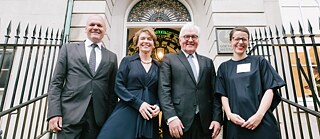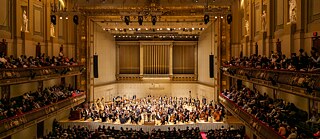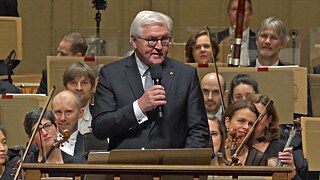The end of the Year of Germany in Boston
“For the West to remain more than a direction on the compass”

At a joint concert by the Leipzig Gewandhausorchester and the Boston Symphony Orchestra, German Federal President Frank-Walter Steinmeier heralded the end of the Year of Germany in the USA.
By Christoph Mücher
There’s nothing particularly remarkable about the number 2,261. But it has special significance for the Year of Germany in the USA: Since Federal Foreign Minister Heiko Maas opened the largest foreign cultural and educational policy project to date, no fewer than 2,260 events have been held. Concerts, road trips, exhibitions, discussions, a big pop-up tour, a little St. Martin’s procession, VR presentations, digital festivals, analogue encounters at schools, universities, Oktoberfests and business fairs – every event that could be held was held.
“For democracy and freedom to have a future in this world”
The Year of Germany reached more than 500 locations in all of the 50 states, welcoming over a million visitors. “Wunderbar Together” proclaims the motto of the Year of Germany optimistically, evoking the deeply rooted friendship between the two civil societies. This is reflected in countless partnerships and exchange programmes. A very special one was celebrated in Boston at the end of the Year of Germany: the cooperation between two world-famous orchestras. There have been connections between the Boston Symphony Orchestra and the Leipzig Gewandhausorchester for over 100 years. For almost two years, this connection has had an entirely new feature: the two orchestras share their conductor, Andris Nelsons of Latvia. For the finale of the Year of Germany, the orchestras played together as part of a “Leipzig Week” in Boston. It was a musical sensation and a welcome occasion for the patron of Wunderbar Together, Federal President Frank-Walter Steinmeier, to pay a visit to the USA and “his” Year of Germany. The President offered a positive summary of the campaign and subsumed the uninterrupted need for being Wunderbar Together, saying, “For democracy and freedom to have a future in this world full of challenges and conflicts, for the West to remain more than a direction on the compass, we need each other.”

“A meaningful symbolic act”
Before the symphonic finale of the Year of Germany, the Federal President had another job to do. After two years of renovations, the Goethe-Institut invited guests to the reopening of its first institute in the USA. The historic townhouse in the centre of Boston has been completely refurbished and was now handed over to the public by the Federal President. “A meaningful symbolic act,” commented Secretary-General Johannes Ebert at the opening. “The Year of Germany is coming to an end, but the Goethe-Institut remains and, with three new or completely renovated locations, is an appealing meeting place for Americans and Germans.”
“The Goethe-Institut creates spaces for encounters, for learning, for relationships.”
A week after the ceremony in Boston, the regional headquarters of the largest German cultural mediator will move into its new accommodation on vibrant 14th Street in Washington, DC. Three days later, the shell of the Goethe-Institut’s new home in Los Angeles, in culturally diverse McArthur Park, will be dedicated. “With this new start in a very important partner country, we hope we are bringing along some of the verve of the Year of Germany,” affirms Ebert. He can count on the support of the Federal President. “And now: Year of Germany is over, memory card full, is that all? No, this Goethe-Institut is the guarantee in stone that it wasn’t all ... The Goethe-Institut creates spaces for encounters, for learning, for relationships. We need these places more than ever today.”
